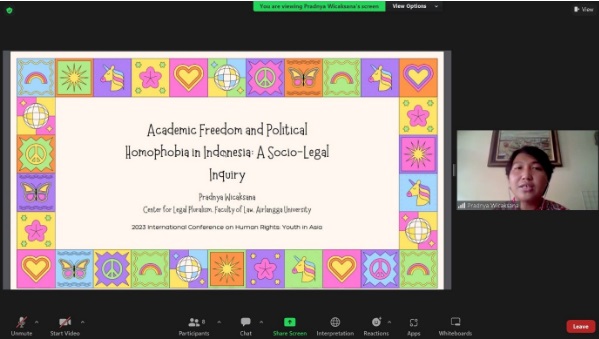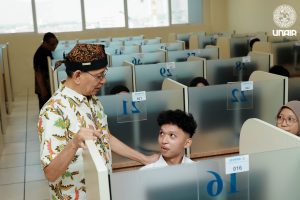An unprecedented anti-LGBTQ+ campaign at universities in Indonesia has started to increase since 2015. Society views LGBTQ+ people as a threat to masculinity and the nation’s future. This creates political homophobia.
A homophobic academic environment is a form of human rights violation. Academic freedom is a human right.
This was conveyed by alumni of the Faculty of Law, Universitas Airlangga (FH UNAIR), Pradnya Wicaksana, at the international conference “2023 International Conference on Human Rights Youth in Asia” on Sunday (26/3/2023). The meeting, which carried the main topic of human rights, was attended by participants from various countries and was held in a hybrid manner.
“Examples of this violation of human rights and academic freedom are the forced cancellation of an academic conference at Brawijaya University and the forced disbandment of the student press at the University of North Sumatra for releasing a short story discussing lesbianism,” said Pradnya.
“Academic freedom should be independent and interdependent. Academic freedom is based on rights such as freedom of opinion and expression, the right to assemble peacefully, the right to education, and the right to benefit from scientific progress,” he continued.
The results of Pradnya’s research found that political homophobia arose due to the domination of predatory practices in Indonesia. Politicians who engage in predictive practices will use any means to gain political support, such as exploiting anti-LGBTQ+ sentiments because heterosexism politics is the status quo in Indonesian society.
“Amid political homophobia, universities in Indonesia fail to promote an inclusive democratic culture because of their vulnerability to politicization from the state. In addition, the academic environment cannot be critical of the status quo due to the legacy of the New Order’s depoliticization and the neo-liberalization of the Reformation era,” explained Pradnya.
On the other hand, added Pradnya, legal protection for academic freedom in Indonesia is insufficient to protect LGBTQ+ individuals and discussions. Under Law Number 12 of 2012 concerning Higher Education, academic freedom is not recognized as a human right. As long as the logic of political homophobia persists, individuals and discussions about LGBTQ+ are vulnerable to arbitrary restrictions due to being seen as a threat to religious values and national unity.
“Political homophobia in Indonesian universities stems from a lack of institutional autonomy. Dominant predatory politics can influence university performance. The lack of adequate legal protection also exacerbates this. Currently, strengthening institutional autonomy and revising the Higher Education Law are needed to overcome existing problems,” Pradnya concluded.








